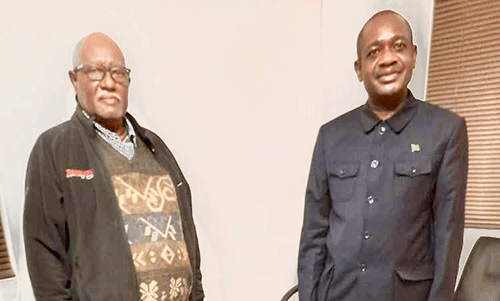Dr Peya Mushelenga
As we celebrate Heroes Day this year, we are grateful for the valuable roles played by illustrious sons and daughters of Namibia for the cause of Namibia’s independence. One such outstanding personality is Dr Thomas Ihuhua.
Born 75 years ago in Fransfontein by Toini Ihuhua and Christian Bamm, the young Thomas moved to Windhoek when his mother got married to Christian Iyambo, and enrolled at the Rhenish Herero Primary School. He attended secondary school at Augustineum in 1961, where he met, among others, Hage Geingob. By then he had already rubbed shoulders with the Founding President, Sam Nujoma, who was a friend to his parents, and godfather to his younger siblings, the late Maria Iyambo and Dr Tangeni Iijambo, currently a member of parliament.
After matriculation in 1965, Thomas went to the University of Fort Hare to pursue a Diploma in Education. Initially, he wanted to study medicine, but he had no Mathematics at high school. While at the university, he studied for Mathematics by correspondence at Damelin Correspondence College. He then pursued his dream by enrolling for the Bachelor of Medicine and Bachelor of Surgery (MBChB) at the University of Natal in 1969, where he met a fellow Namibian Naftal Hamata enrolling in the first year. Thomas received credits for some courses and, therefore, started in the second year.
During holidays, Thomas kept himself busy at Onandjokwe Lutheran Mission Hospital. Following the completion of his studies in 1973, he worked as an intern in Durban, 1974. In 1975, Dr Ihuhua came to Namibia as the first black medical doctor to work at Onandjokwe hospital. By then, other blacks who became doctors before him, like Dr Libertina Amathila, were in exile. He was responsible for the Lutheran Church hospitals and clinics in the then Owambo and Kavango areas. Dr Ihuhwa carried out outreach programmes to Eenhana Health Centre, and the clinics at Okongo and Omundaungilo. He treated and provided medical supplies to guerrilla fighters of the People’s Liberation Army of Namibia (PLAN). To add salt to the injury, he even named his son Struggle.
My goodness, the colonial authority had enough of his audacious conducts. He was becoming too big for his shoes. Before he knew it, from 1976, he was frequently shuttling between the hospital and jail. In April 1979, he was arrested under AG 33 of 1979 (later amended to the notorious AG 26 of 1985) and released in February 1980.
The colonial authority was not yet done with him. He was confined under house arrest and specifically banned from travelling to the then Owambo area, effectively separating him from his family – his wife and children were based in the northern area. Poor Dr Ihuhua only went back to northern Namibia after independence.
The colonial regime sought to teach Dr Ihuhua a lesson, keeping him penniless. In a self-styled miscalculated move, it blacklisted him for employment. But who cares? Did the regime really expect a qualified medical doctor to starve in the street? The devil is a liar!
Dr Neville Cupido invited Dr Ihuhwa to work under him at his private practice in Katutura. Wonders shall never cease to happen! But, hold on! To the colonial masters, the game was not over. They were determined to belittle him. Dr Ihuhua could work privately but they wouldn’t let him buy a house.
They resolved that “of hy wil of nie’ (whether he likes it or not), he had to lodge at his parents’ overcrowded two-bedroom house – Oh, no! A whole medical doctor! What a cruel system! Later, he moved to a municipal house in Soweto – and it was only in 1988 that he was permitted to buy a house.
After all the harassments and humiliations, what did the colonial authorities really achieve? They bumped themselves against the wall. Dr Ihuhua continued providing treatment to PLAN fighters in Windhoek. Wonders shall never cease to happen. He further travelled as part of the Swapo delegation to the Geneva Conference in 1981.
In the same year, he was elected to the Swapo National Executive Committee at home, holding the portfolio of secretary for health. Dr Ihuhua also attended the Lusaka talks between Swapo, Multi Party Conference parties and the Administrator-General in May 1984. In October 1988, Dr Ihuhua attended the Swapo Consultative Conference in Kabwe, Zambia. Following Namibia’s independence, he was elected to the Swapo Party Central Committee at the Congress held in December 1991.
Dr Ihuhua is a true son of the soil. As the first black medical doctor inside Namibia, he inspired a lot of his countrymen and women to pursue the profession. He was not just your doctor to put on a white coat, stethoscope and prescribe chloroquine to patients. He was a selfless compatriot who sacrificed much for the cause of Namibia’s independence.
Dr Ihuhua has been a popular general practitioner in Windhoek, as he served the low-income and unemployed with empathy – what a humanity! He has now retired from his practice a few years ago and is actively involved in farming. Long live Dr Ihuhua!


